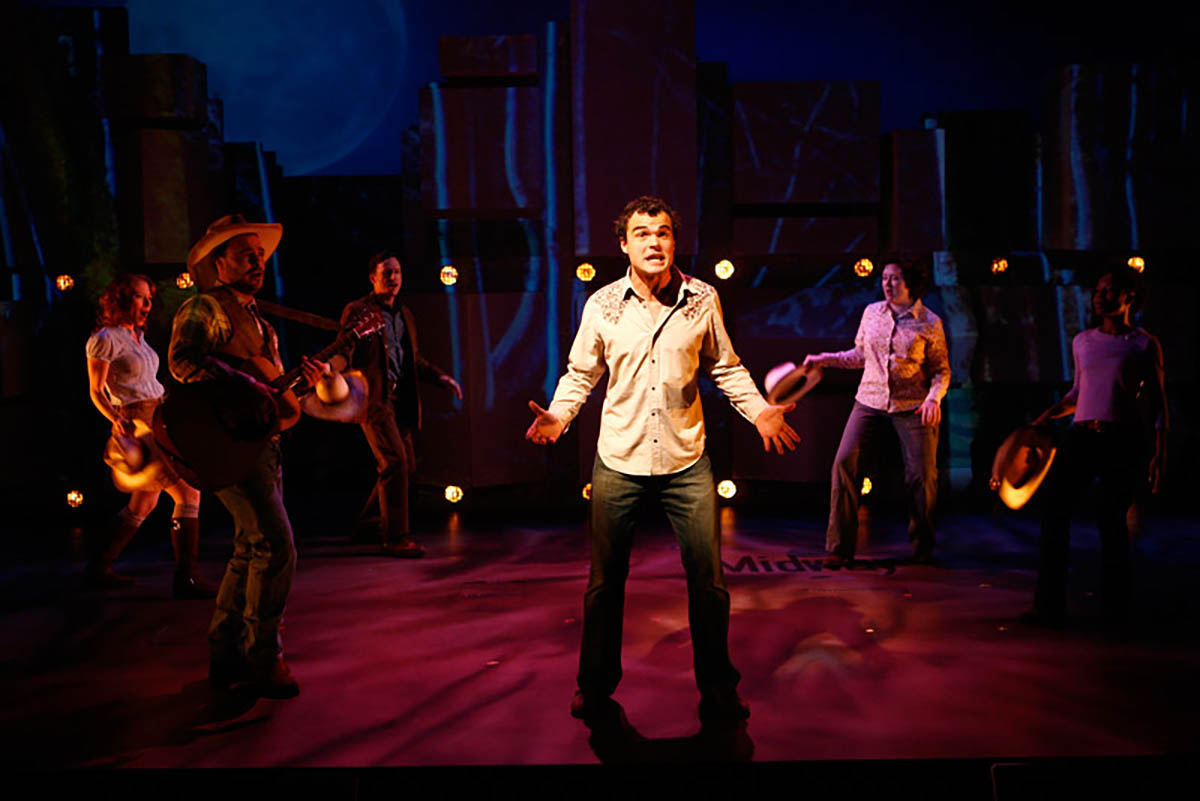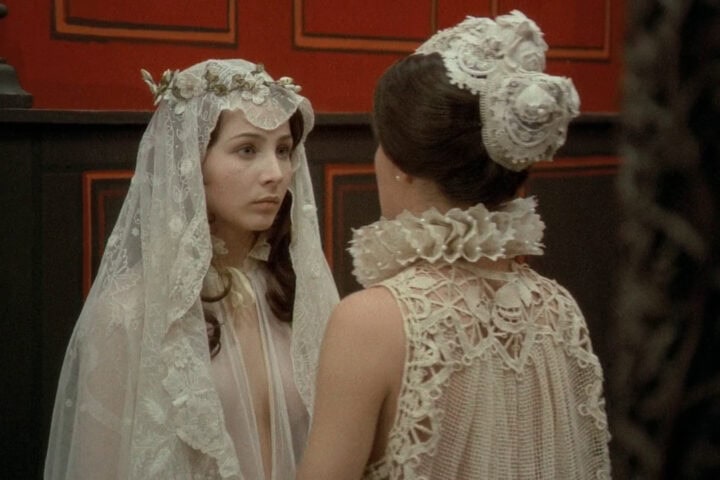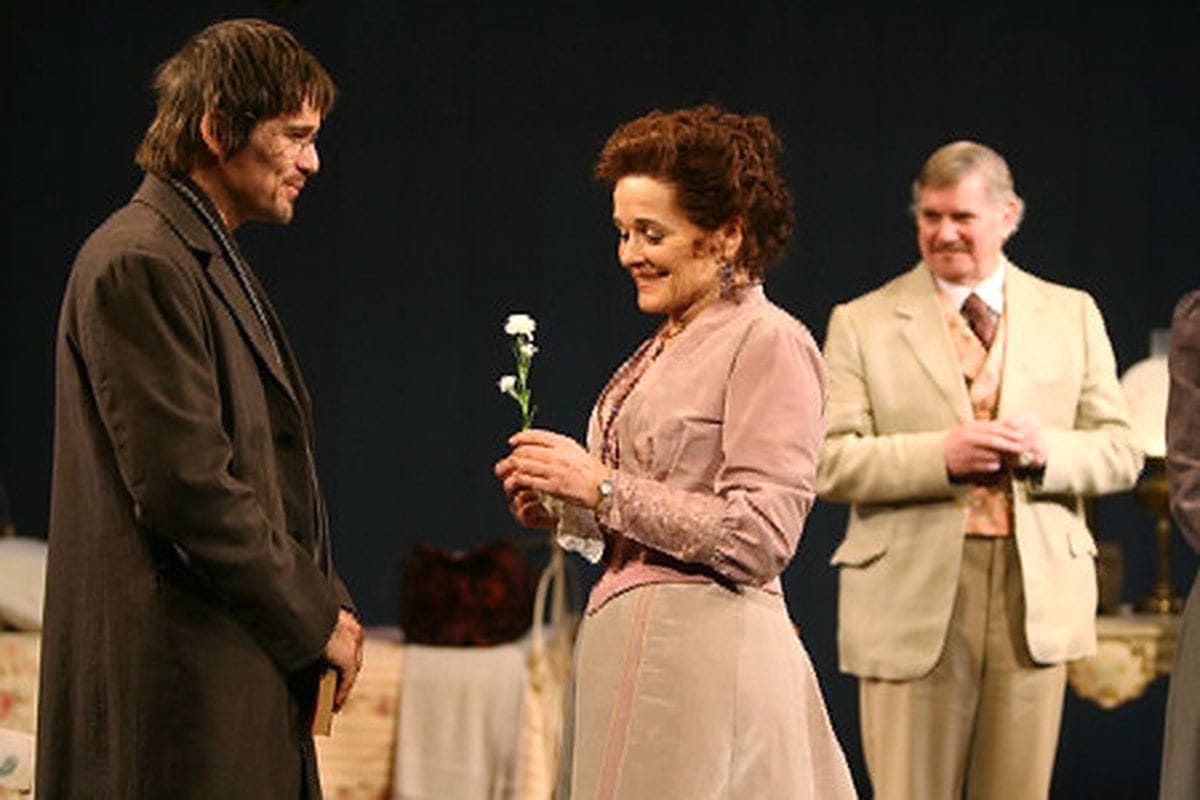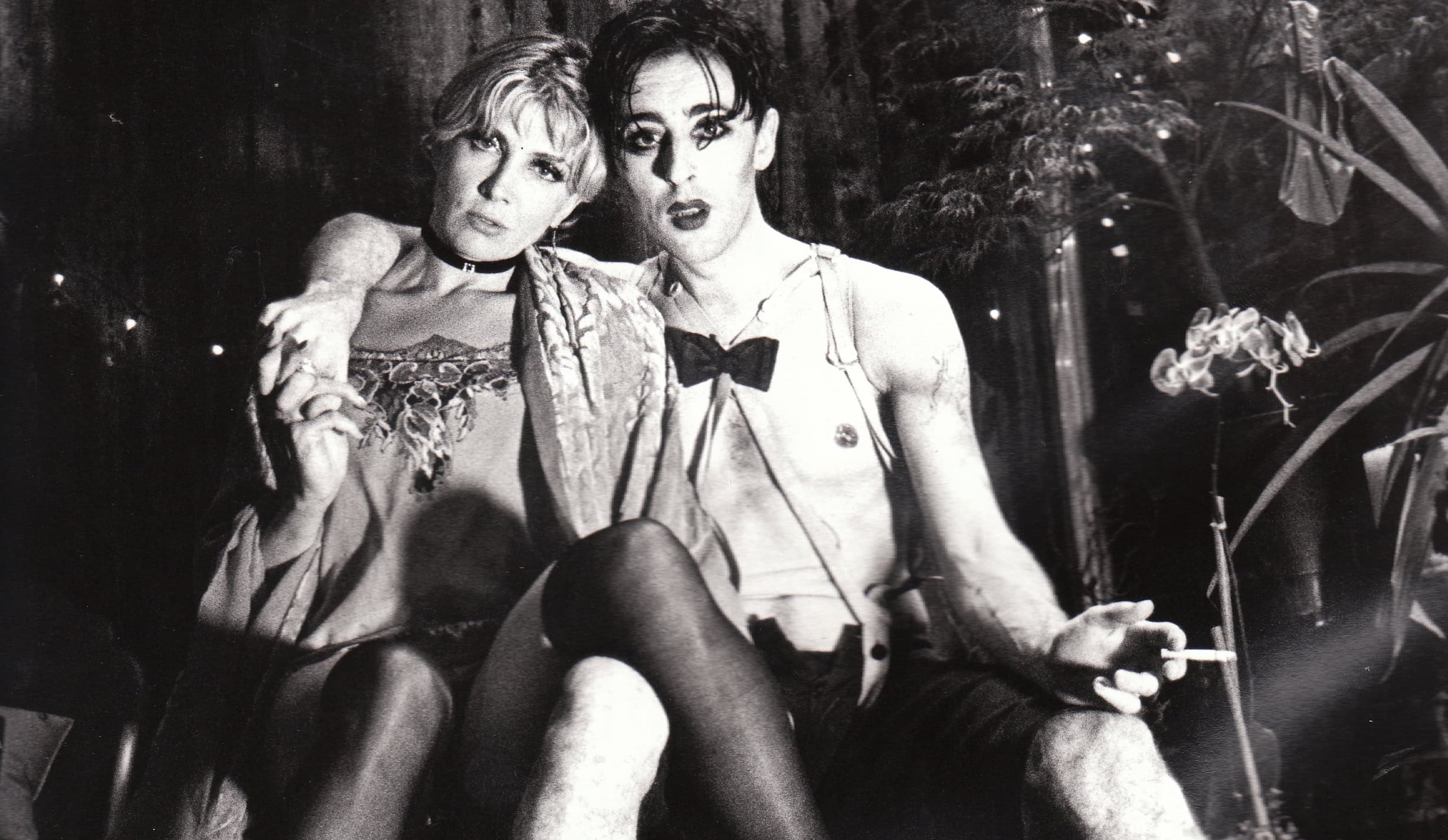As someone who grew up in the hardcore/new wave/goth scene in Colorado Springs in the late ’80s, and who recently reviewed Alexandra Pelosi’s The Trials of Ted Haggard and penned a column entitled “In Defense of Ted Haggard,” I was anxious to wrap up my trip through Pastor Ted-land with This Beautiful City, the latest production from the Civilians, the acclaimed “documentary theatre company” that this time around has immersed itself in the mega-church movement (and its opposition) in Colorado Springs. It’s now playing at the Vineyard Theater through March 15th—so you still have time to catch it before it wins a well-deserved Obie and transfers to Broadway.
Unlike Pelosi’s skin-deep HBO doc, This Beautiful City provides a thoroughly researched context for the evangelizing of Colorado Springs. Over coffee at a downtown cafe the Alt Writer (Brandon Miller, just one of six flawless cast members)—a disgruntled native who laments, “We could have been like Santa Fe, now I feel like I’m living in Middle-earth” and shows us his “church kicking” slideshow (yup, photos of his friends going up to various church buildings and delivering a kick) projected onto one of many smartly employed screens—dispenses the cultural history of the town from the 80s through the 90s, when the city commissioners brought in the evangelical nonprofits in an effort to jumpstart the economy. Opening on a “wild west” note, complete with singing cowboys, the production quickly deconstructs that very cliché through nuanced, finely drawn characters without a twang in their voice. In other words, portraits of real people are given the non-condescending respect they deserve.
Yet make no mistake, this is no dry journalistic rendering of a community that found itself the focus of James Dobson’s “Family,” that Pastor Ted (played by Stephen Plunkett, employing pitch-perfect vocal and facial expressions) claimed for his stated mission to “make it hard to go to hell in Colorado Springs,” as a New Life Associate Pastor (Brad Heberlee) explains. This Beautiful City is a swift-moving “walking tour” through a fairly big town situated in the shadow of Pikes Peak (and home to the Air Force Academy and NORAD as well), utilizing the source material interviews not just for its ingenious script, penned by company founder Steven Cosson and Jim Lewis, but for the lyrics to its hip indie score by Michael Friedman.
Nothing is wasted and The Civilians make the most with very little. Neil Patel’s set design consists mainly of simple, unobtrusive white boxes that double as screens on which to project such images as photos of Ariel Sharon and Barbara Walters (during a song called “An Email from Ted Haggard,” in which the pre-meth-and-rent boy-scandalized pastor keeps his congregants up to date on his celebrity hobnobbing). Marsha Stephanie Blake segues back and forth between White House spokesman and a reporter for CNN (yes, interviewing herself) through only body language and a single necktie as a prop. Blake also has a tour de force turn in drag as New Pastor at Emmanuel—“If your phone doesn’t ring, call yourself!” he urges the flock—the motivational firebrand who took over for Ben Reynolds, the leader of the biggest black church in Colorado Springs, until he was kicked out in his own homosexual scandal. The irony that, unlike Haggard, Reynolds’ conscience forced him to out himself (in order to “put a face on same-sex love” during Colorado’s heated battle over gay rights in the last midterm elections) is not lost on The Civilians, any more than the fact that both evangelicals and anti-evangelicals alike share common ground in having homosexual relatives that they deeply love.
The Civilians’ make-the-most ethos extends to the six empathetic cast members whose collective energy radiates that of an ensemble four times the size. They seem to be having a blast (and not just during the balloon fight, which is inventively accompanied by the characters reciting emails right down to “posted by” and their screen names). They all express themselves with a crucial physicality that allows them to make a nearly bare stage interesting through words and movement alone and the production itself is extremely organic. David Weiner’s expressive lighting, Cosson’s directing, the multimedia aspect from Jason H. Thompson’s projection design, and the acting and music all work as a single piece, like a tightly paced orchestra, and it quickly becomes clear that Colorado Springs is much more than the sum of its religious right parts.
There’s a sizeable transgender community in this military town (Fort Carson Army Base and the Air Force Academy were there long before Pastor Ted started his church in the basement of his home), not far from new-agey Manitou Springs, where the Revolution House of Prayer, a.k.a. “RHOP,” often holds services in a nearby cave. The staging of the RHOP sequences, through Weiner’s lighting and juxtaposed with Haggard’s scandal, is impressive to say the least, as is Alison Weller in the beehive hairdo and Tammy Faye makeup donned for the RHOP member who says that if she sees a woman in the play with a beehive hairdo and Tammy Faye makeup, “I’ll know that’s me.” Ackerman’s T-girl amusingly muses that most people mistakenly think that transgender women are “drag queens that just won’t quit,” but she also gets a final moving speech in which she explains why “I will not leave my city,” that hostile environment that she also calls home.
Yes, Pastor Ted goes down (leading to an even bigger surprise in the reaction from his own son Marcus, also played by Plunkett, who recalls initially thinking, “Oh, yeah, that sounds Haggard-esque”), but so do gay rights when all the ballots are counted at the end of the day. As the play finishes up, the pieces fall where they may, and Miller’s RHOP leader heads for Kansas City, delivering a “video podcast while driving” onstage. It’s Ackerman’s Pikes Peak park ranger that gets the last line, a bit of wisdom for mountain survival: “Stay alive for as long as you have to stay lost.”
This article was originally published on The House Next Door.
Since 2001, we've brought you uncompromising, candid takes on the world of film, music, television, video games, theater, and more. Independently owned and operated publications like Slant have been hit hard in recent years, but we’re committed to keeping our content free and accessible—meaning no paywalls or fees.
If you like what we do, please consider subscribing to our Patreon or making a donation.





